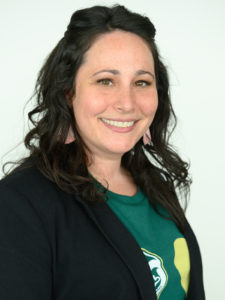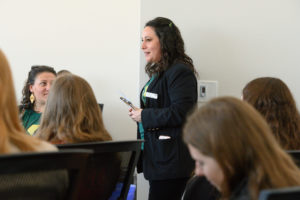
Student writer Andrea Day contributed to this story.
The School of Education at Colorado State University recently welcomed Assistant Professor Kara Coffino to its faculty. Coffino also serves as the co-director of the School’s Center for Educator Preparation, where she is perfectly placed to help diversify the teaching force – work she is passionate about pursuing.
Invested in the advancement of education
Coffino began her career in education in Mississippi, where she worked as a teacher and literacy coach for five years. Later, she attended the Columbia University-Teachers College in New York City for a master’s degree in organizational leadership, earning a principal’s license as well. It was at the University of Minnesota where Coffino realized her true passion while receiving her Ph.D. in curriculum and instruction, with a focus on literacy education.
“I see teaching as my social and political action,” she said. “It’s the way that I work to make a difference and change starting from the bottom and moving up. The time I spent teaching in rural schools and supporting teachers and leaders in urban schools has shown me the deep inequities in our nation’s public schools and serves as my compass in the work of preparing educators.”
In Minnesota, Coffino led the University of Minnesota’s collaboration efforts with Austin Public Schools, a rural school district in southeastern Minnesota, to design a new STEAM-focused (Science, Technology, Engineering, Arts, and Math) intermediate school for all learners in the district. Here, she aimed to level the playing field and encourage varied learning for students.
“I collaborated with district leaders and the principal in residence on curriculum and school building design, and we spent a year working with the staff who would be opening the school,” said Coffino. “I supported teachers in developing their knowledge base and capacity around integrated thematic instruction and inquiry-based learning to support culturally and linguistically diverse students.”
After the STEAM program, Coffino designed and led the Alternative Pathways to Teaching program at the University of Minnesota. Through this program, Coffino worked to create a system that developed and supported a diverse teaching force.
“One of the important things when thinking about developing alternative pathways in teacher preparation is maintaining the high standards and key pieces of a successful teacher education programs,” Coffino said. “In designing the program, I had to take what I know is essential to prepare teachers in order to be successful in classrooms and adapt it for a different structure, while maintaining academic rigor and high levels of support.”
Creating new pathways

Coffino plans to use her experience to bring her passion and academic focus of diversifying the teaching population to the CEP teacher licensure program. She also hopes to utilize her scholarly interest in coaching and mentoring to further develop the coaching model for teacher candidates in the program.
“What I took from my experience in Minnesota is understanding how to take what we know is essential and what we know works in teacher education and adapt it based on the contextual needs of the learners we’re supporting,” said Coffino. “I’m excited to take the things that I know have worked in other contexts and think about how to integrate them into our programs at CSU.”
Coffino is passionate about recruiting and retaining teacher candidates from groups that are traditionally underrepresented in teacher preparation programs.
“What excites me is thinking forward to how the Center for Educator Preparation can take the commitment that CSU already has to recruiting and retaining first generation students and integrate it into the teacher education program,” said Coffino. “We can create pathways to teaching for first generation college students and students from traditionally marginalized groups and work to ensure that we have teachers going into the workforce that reflect the identities of students in classrooms across the state of Colorado.”
Coffino also stresses the importance of an encouraging coaching model for teacher candidates. She hopes to add to the work already being done by the CEP faculty to develop layers of support that allow educational opportunities not only for future teachers, but for their coaches.
Big university, big heart
Coffino, having been at CSU for one semester, already feels welcomed by the community and is excited to continue forward as a professor, researcher, and leader.
“When I read the job posting, I felt like it was a great match for my academic interests and professional skills; when I got to see CSU in action during my campus visit, I realized that everything I had read that CSU was doing is actually what’s happening and I wanted to be a part of it,” said Coffino. “Being here now, it’s even more apparent that there are constantly opportunities and spaces to have an idea, propose it, and figure out how to make it work.”
Coffino has already put that observation to the test. She recently spearheaded efforts to take advantage of an opportunity through the CSU Provost’s Office, seeking funding for a post-doctoral research fellow who would study CEP-related topics in education and access. In February, Coffino learned that these efforts were successful. She said she’s looking forward to additional opportunities to work with campus partners on future projects.
“One thing that I really love about CSU is that it’s a major teaching and research institution, yet it still feels like a small community where you actually get to know people at all levels. I feel so welcomed and excited to be here.”
The School of Education is part of CSU’s College of Health and Human Sciences.